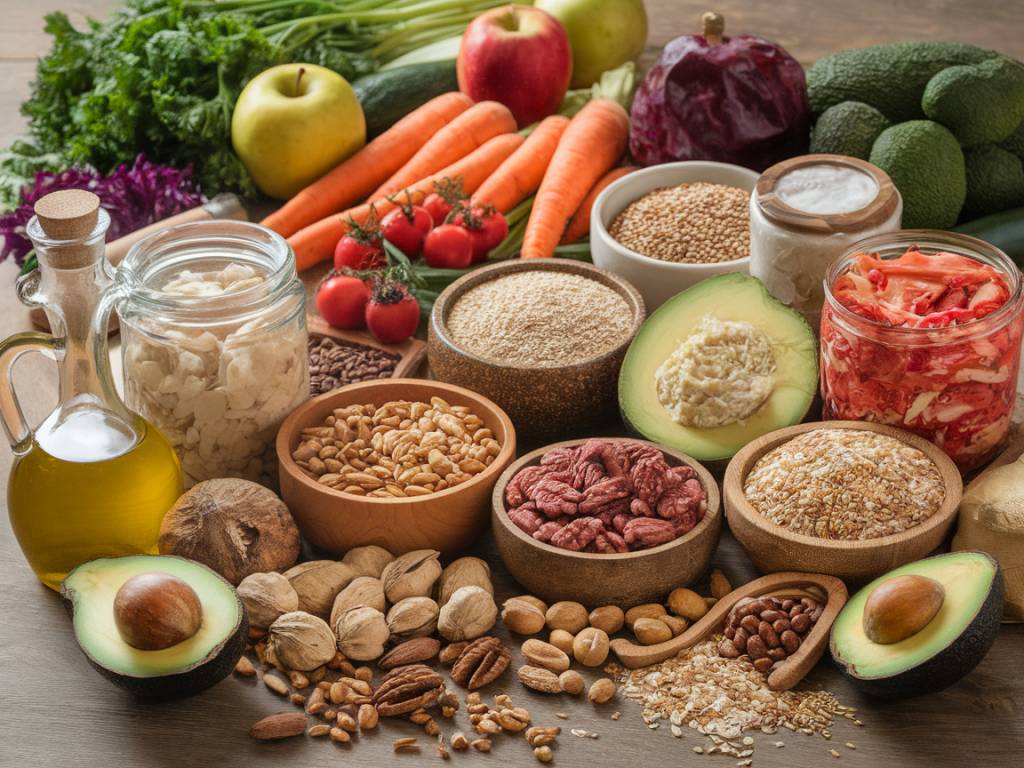Why Gut Health Matters
Your gut is home to trillions of bacteria, fungi, and other microorganisms that make up your gut microbiome. This invisible ecosystem plays a crucial role in digestion, nutrient absorption, immune function, and even mental health. When it’s out of balance, you might experience bloating, fatigue, skin problems, and even mood swings.
The good news? You have the power to maintain a healthy gut microbiome through mindful dietary and lifestyle choices. Let’s explore how you can do that.
Eat More Fiber-Rich Foods
Think of fiber as food for your gut bacteria. A high-fiber diet promotes the growth of beneficial microbes, which in turn improve digestion and reduce inflammation.
Here are some excellent fiber-rich foods to include in your meals:
- Legumes like lentils, chickpeas, and black beans
- Whole grains such as oats, quinoa, and brown rice
- Vegetables like broccoli, artichokes, and Brussels sprouts
- Fruits including apples, pears, and berries
- Nuts and seeds like almonds, flaxseeds, and chia seeds
Incorporate Fermented Foods
Fermented foods contain probiotics—live bacteria that contribute to a healthy gut balance. Regularly eating fermented foods can help replenish and diversify your microbiome.
Some great probiotic-rich options include:
- Yogurt (look for varieties with active live cultures)
- Kefir
- Sauerkraut
- Kimchi
- Kombucha
- Miso
- Tempeh
Limit Processed Foods and Sugars
Highly processed foods and excess sugar can disrupt the balance of your gut bacteria, promoting the growth of harmful microbes. Artificial sweeteners, commonly found in diet sodas and low-calorie snacks, can also negatively impact gut health.
If you’re craving something sweet, opt for natural alternatives like fresh fruit, honey, or dark chocolate (in moderation, of course!).
Stay Hydrated
Water is essential for digestion and overall gut health. Proper hydration helps maintain the mucosal lining of the intestines and supports the movement of food through your digestive tract.
Try to drink at least eight glasses of water per day, and if plain water feels boring, opt for herbal teas or infused water with lemon, mint, or cucumber.
Manage Stress
Your gut and brain are closely linked through the gut-brain axis, meaning stress can directly affect your gut microbiome. Chronic stress weakens the beneficial bacteria, leading to digestive issues and inflammation.
To reduce stress and support gut health, consider these techniques:
- Practicing mindfulness or meditation
- Engaging in regular exercise
- Getting outdoors and soaking up nature
- Prioritizing quality sleep
- Trying breathwork exercises
Even a few minutes of deep breathing or a brisk walk can make a difference in lowering stress hormones that can disrupt your gut.
Prioritize Sleep
Just like the rest of your body, your gut needs rest. Poor sleep has been linked to an imbalanced microbiome and increased levels of harmful bacteria.
To improve sleep quality and support gut health:
- Stick to a consistent sleep schedule
- Avoid screens before bed
- Limit caffeine intake in the afternoon
- Create a relaxing bedtime routine
- Ensure your bedroom is cool and dark
Your gut and sleep work in harmony—when one thrives, so does the other.
Move Your Body
Regular exercise doesn’t just benefit your cardiovascular system; it also enhances gut health. Physical activity increases microbial diversity, which is associated with a healthier digestive system.
Find an activity you enjoy, whether it’s brisk walking, yoga, cycling, or strength training. Even mild exercises, like stretching or gentle movement throughout the day, can make a positive impact.
Avoid Overuse of Antibiotics
While antibiotics are sometimes necessary, overusing them can harm your gut microbiome by wiping out both bad and good bacteria.
If you must take antibiotics, consult your healthcare provider on ways to support your gut, such as incorporating probiotics or eating fermented foods.
Try a Probiotic Supplement
If your diet lacks probiotic-rich foods, a high-quality probiotic supplement might help maintain bacterial balance. Look for one with diverse strains and CFUs (colony-forming units) suited to your needs.
Before starting any supplement, consult your doctor to ensure it’s right for you.
Listen to Your Gut
Your body constantly sends signals about your health, including your gut. If you experience frequent bloating, discomfort, or irregular digestion, it may be time to tweak your dietary habits.
Start by incorporating more whole, unprocessed foods and observing how certain foods make you feel. Keeping a food journal can help you identify triggers that might be affecting your microbiome.
Small Changes Lead to Big Results
Your gut microbiome is dynamic, meaning it responds quickly to dietary and lifestyle changes. The key is consistency—small improvements over time will lead to a healthier, more balanced gut.
Now that you know how to nourish your microbiome, which of these habits are you excited to try? Let me know in the comments—I’d love to hear about your journey toward better gut health!



